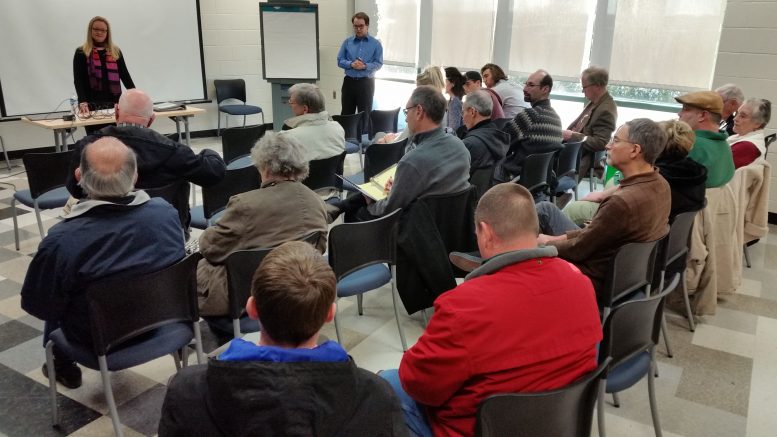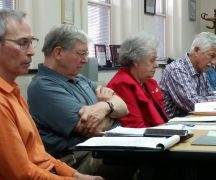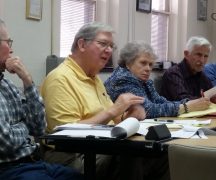By JAN LARSON McLAUGHLIN
BG Independent News
Citizens are speaking up on changes they might like to see in the Bowling Green City Charter. Should council races be non-partisan? Should all council terms be four years? Should it be easier for citizens to have input on environmental and health issues? Should the charter address rental housing standards?
Not a single citizen showed up for the first public meeting on updating the city charter. But on the second meeting, Thursday evening, there were seven citizens, several charter review committee members, council members and city administration officials.
The city charter documents how city government is run. It was adopted in 1972, then reviewed in 1990 and 2001. A 17-member citizen committee is currently collecting public input, discussing possible revisions, then will make recommendations for changes to City Council.
The changes must be approved by Bowling Green voters in the November election for them to become part of the charter.
“Each individual section has to be voted on separately,” said Shannon Orr, one of the co-chairs of the charter update committee with Jeff Crawford.
Orr explained that another public meeting will be held once the committee has come up with its suggested revisions. The city charter can be viewed on the city website, and citizens can submit their ideas through email or by contacting a committee member.
At last week’s meeting, citizen Stu Stearns, who served on the charter review committee in 2001, said a May deadline for getting the revisions to City Council may be too tight of a timeline.
“Most people don’t even know what’s in the charter,” Stearns said.
Orr agreed the timeline was ambitious – but also necessary since the revisions must go to council by May to get the changes on the November ballot. She assured Stearns and others that citizen input is being sought.
“We’re giving the public plenty of opportunities,” Orr said, noting the city website where comments can be submitted. “It’s really easy for people to contact us.”
Citizen and BGSU student Brad Holmes suggested that the charter be changed to allow more of a platform for citizens to stop projects like the Nexus pipeline. A charter amendment was on the last November ballot to stop the pipeline and other environmentally unhealthy projects. That effort failed.
“It feels as if community members don’t have a strong power to say ‘No,’” Holmes said. “It seems as if we don’t have much democratic say in this.”
Stearns said that citizen input process is covered under the power to referendum.
Holmes said the referendum process seems cumbersome and doesn’t appear easy for citizens to use. “I think it should be more accessible to voice our opinions,” he said.
But Stearns said that the detailed referendum process may result in more well-planned efforts. “It makes sure that what you’re doing is done the right way,” he said.
Citizen and former council member Joyce Kepke said the city government powers detailed in the current charter work well. The roles and authorities of the council, mayor and city administrators were well planned.
“The balance of powers placed in the charter was very wisely done,” Kepke said.
Chet Marcin, a member of the charter review committee, noted that the current charter requires council candidates to declare a political party.
“Should we consider non-partisan races,” Marcin asked.
City Council member Bruce Jeffers asked if all council terms should be changed to four years. Under the current charter, ward council members serve two-year terms, while at-large members serve four-year terms.
But citizen and BGSU student Ross Martin said a switch to all four-year terms would discourage college student participation.
Holmes suggested that more city department and commission members should be elected by city voters rather than appointed to their positions.
Charter review commission member Mark Hollenbaugh disagreed.
“I think electing those would politicize those positions,” he said.
Holmes also suggested the charter allow for policies that would guarantee rental properties meet certain safety standards.
“There should really be something built into the charter on the rights of renters,” he said.
Holmes expressed his appreciation for the charter review public meeting.
“Thank you on behalf of the other 18,000 students” who didn’t attend, he said.
Hollenbaugh then thanked the four BGSU students at the meeting, on behalf of the other 16,000 full-time residents of the city not at the meeting.
“We appreciate you coming out and participating,” Hollenbaugh said.



